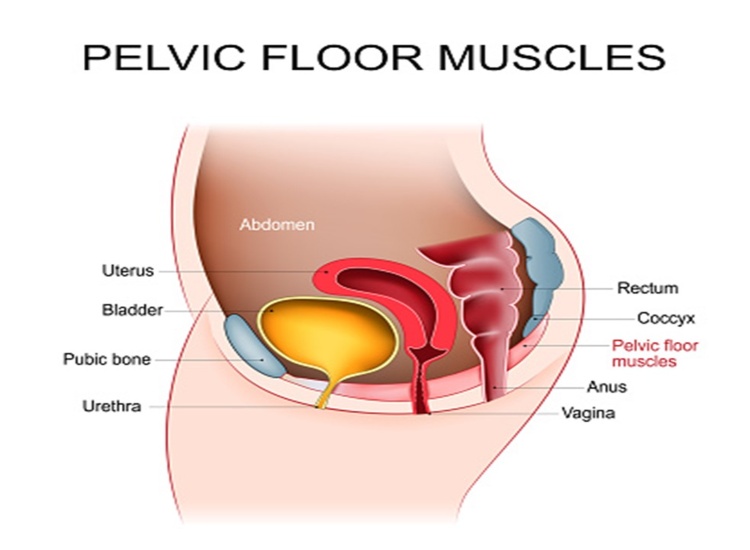Pelvis Floor Dysfunction in Katy, TX
Comprehensive Pelvic Floor Therapy
Understanding pelvic floor dysfunction is the first step toward addressing your discomfort. Dr. Vivian Asamoah is here to serve as your guide, providing comprehensive pelvic floor therapy in Katy, TX. Discover compassionate care and a personalized experience that helps you alleviate your pelvic floor disorder.

Understanding Pelvic Floor Dysfunction
Pelvic floor dysfunction impacts one’s ability to relax and coordinate the pelvic floor muscles. The pelvic floor houses organs, including the uterus or prostate, bladder, and rectum. With pelvic floor dysfunction, the body tightens the muscles connected to these organs, resulting in tension and a range of uncomfortable symptoms.
Causes of Pelvic Floor Dysfunction
The exact cause of pelvic floor dysfunction remains a mystery. However, there are several identified factors that contribute to this condition, including:
- Traumatic injuries to the pelvis
- Pregnancy
- Straining of the pelvic muscles
- Pelvic surgery
- Being overweight
- Aging
Pregnancy & Pelvic Floor Dysfunction
Pelvic floor dysfunction is commonly linked to pregnancy. During pregnancy, the pelvic floor muscles and connective tissue become worn. This is exacerbated when giving birth, especially for those who experience prolonged labor or a difficult delivery.
Is Pelvic Floor Dysfunction Hereditary?
As previously mentioned, the exact cause of pelvic floor dysfunction is unknown. However, research has shown that pelvic floor disorder can be passed down through your family, making it a hereditary condition.
What Does Pelvic Floor Dysfunction Feel Like?
Pelvic floor dysfunction may vary from one person to the next. The common symptoms of this condition include:
- • The urge to urinate or defecate frequently
- • Constipation, straining, or forceful pushing to pass bowel movements
- • Painful urination
- • Stool or urine leakage
- • Unexplainable lower back pain
- • Unexplainable genital, rectum, or pelvic pain
Pelvic Floor Dysfunction In Men & Women
Pelvic floor dysfunction can affect men and women of any age. Pelvic floor dysfunction across both sexes results in an impact on the pelvic floor muscles, reproductive system, and excretory system. However, men and women may experience varying symptoms.
Pelvic Floor Dysfunction In Women
Pelvic floor dysfunction in women can alter a woman’s reproductive system, compromising the vagina and uterus. This condition can trigger pain during intercourse, incontinence, and other forms of discomfort. However, it’s important not to mistake pelvic floor dysfunction with pelvic organ prolapse, which is when the muscles supporting the pelvic organs stretch or loosen.
Pelvic Floor Dysfunction In Men
Pelvic floor dysfunction in men can arise as a stand-alone or co-existing condition. The common conditions that exacerbate pelvic floor dysfunction in men include:
Leaking urine, incontinence, and other bladder and bowel concerns
Inability to achieve or maintain an erection
Prostate inflammation or infection
Pelvic Floor Dysfunction & Interstitial Cystitis
Interstitial cystitis is a painful bladder condition. The pain in the bladder can impact the pelvic floor muscles, prohibiting muscle relaxation and encouraging loss of strength. As such, those with interstitial cystitis are at a higher risk of pelvic floor dysfunction. Furthermore, interstitial cystitis medications elevate the risk of constipation, worsening pelvic floor dysfunction.
Diagnosing Pelvic Floor Dysfunction
Diagnosing pelvic floor dysfunction involves an assessment of your health history and a discussion of your symptoms. When you visit Dr. Vivian Asamoah for an initial consultation, she will perform a complete physical assessment to identify spasms, weakness, and other areas of concern. Depending on your case, additional diagnostic testing may be recommended.
Treating Pelvic Floor Dysfunction
Pelvic floor dysfunction often entails a simple solution. However, it’s important to note that treatment is not a quick fix and may take several months to achieve maximum relief. Non-surgical pelvic floor dysfunction treatment includes:
- Biofeedback for enhanced muscle coordination
- Pelvic floor physical therapy with a pelvic floor therapist
- Medications, including stool-softeners
- Relaxation techniques
Will I Need Surgery To Treat Pelvic Floor Dysfunction?
Pelvic floor dysfunction involves the muscles. As such, there are no surgical treatment alternatives. If traditional treatment plans do not work, Dr. Vivian Asamoah may recommend pain injection treatments, also known as trigger point injections. These treatments target affected muscles with small injections of numbing agents and relaxation medication.
What Makes Pelvic Floor Dysfunction More Severe?
Pelvic floor dysfunction can be exacerbated by any activity that elevates tension in the pelvic floor muscles. Activities and movements, including heavy lifting, jumping, or straining due to constipation, can worsen symptoms. Additionally, forgoing pelvic dysfunction therapy or medication may increase pain and discomfort.
Can Pelvic Floor Dysfunction Be Cured?
While uncomfortable, pelvic floor dysfunction can be fully treated with the appropriate treatment plan. Treatment may take time to yield complete results. As such, it’s recommended to pursue professional intervention as soon as you recognize persistent discomfort, pain, or straining.
Will Pelvic Floor Dysfunction Go Away Without Treatment?
Pelvic floor dysfunction symptoms, including an overactive bladder or incontinence, may worsen without professional treatment. Even if they do not become more severe, they often will not be alleviated on their own. That is why it’s important to contact Dr. Vivian Asamoah when you recognize the signs of pelvic floor dysfunction.
Contact Dr. Vivian Asamoah
Eliminate relentless pelvic floor dysfunction and achieve long-lasting relief with Dr. Vivian Asamoah in Katy, TX. We’re here to get you on track to prompt and effective treatment that alleviates discomfort, straining, and unfavorable symptoms so you can get back to doing more of what you love. Contact us today to schedule a consultation.
